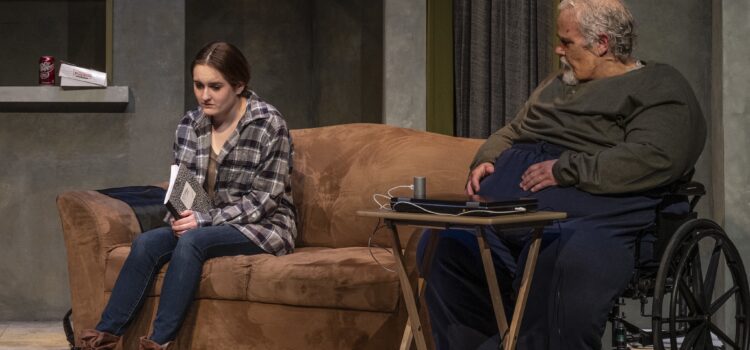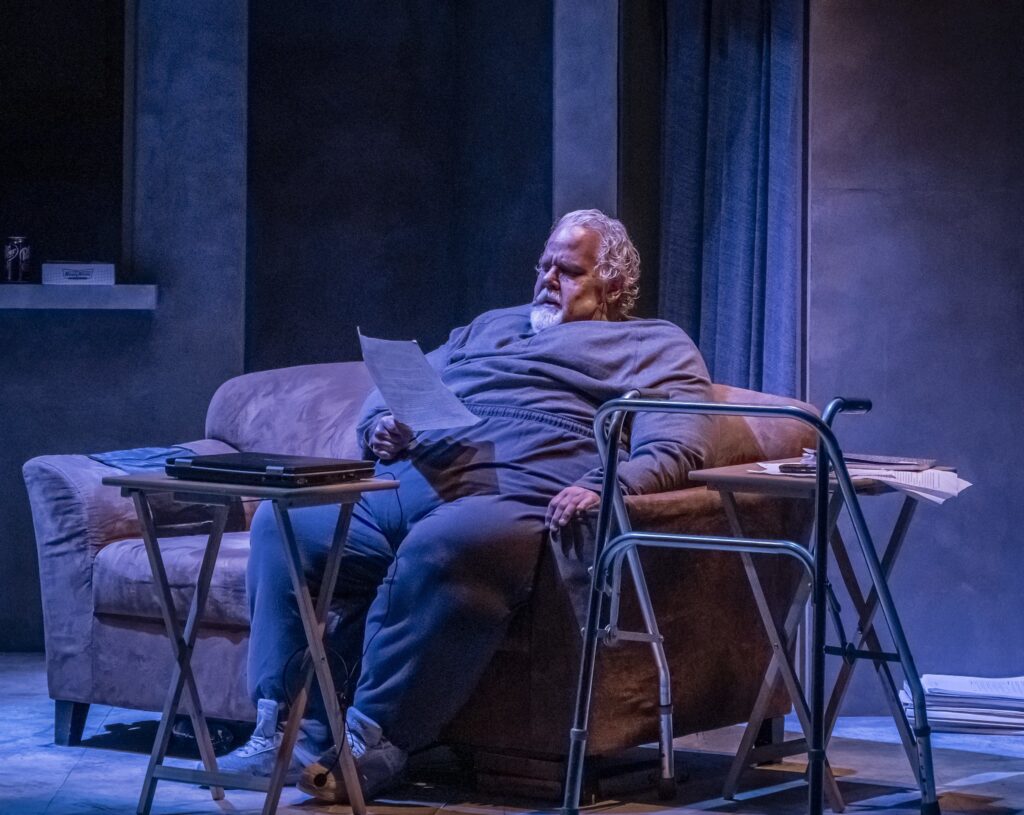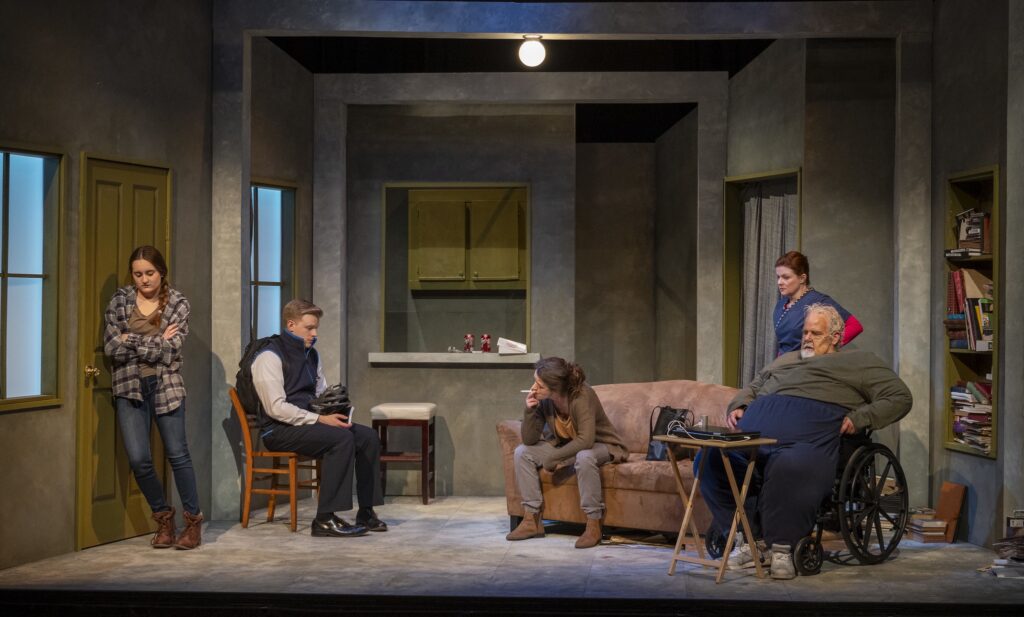By Lynn Venhaus
A personality-driven low-key charmer, the musical ‘[title of show]’ offers a fresh perspective with its vivacious gender-bending cast.
And what’s not to love about a 20-year-old original musical that is unapologetically OK with being “nine people’s favorite thing than a hundred people’s ninth favorite thing”?
In a world of “Cake Boss” and “The Great British Bake Off,” why not choose to be a Rice Krispie Treat? (Nothing wrong with that – and you can have one at intermission, too).
Prism Theatre Company is presenting this enjoyable modest production in two acts with a disarming all-femme quartet of performers and one expert musician accompanying them on keyboard.
Mallory Golden serves as the music director, and they are called “Larry.” They have an occasional spoken line of dialogue and comical in their timing.
They have guy names because Prism did not change those characters when they cast women. The musical’s creators – Jeff Bowen wrote the music and lyrics, Hunter Bell the book – are called Jeff and Hunter, and played by a spunky pair, Katie Orr and Jaelyn Hawkins.
It really doesn’t make a difference – it’s entertaining from this point of view because it is brimming with sly theatrical references and features a classic struggle about pursuing your dreams, no matter what obstacles. Their ambition resonates.
It’s also a tale of friendship, those pals who get you through tough times, who encourage and collaborate – and work through tension and chaos. The four principal actresses project the camaraderie that is necessary to make this show work, under the adroit direction of Sam Hayes.
Being gender-fluid doesn’t change how meta this musical is, because they are two friends who are theater artists writing a musical about writing a musical. Their first goal together is to send in an original work to the inaugural New York Musical Theatre Festival – only its deadline is three weeks away.
Their frantic, fraught creative process, with their real-life obstacles, are what makes the show unique to them. The time and place are New York City, 2004. Starving artists whose endgame is Broadway have their own sets of issues, which factors into the show – all driven by the mindset “If you can make it here, you can make it anywhere.”
And from there, their goals get bigger, their challenges more daunting, and their exasperations and aspirations escalate. It’s clever and funny in a very natural, authentic way.
Rounding out the cast are their two friends they cast in their show. Rachel Bailey is sassy, snarky Susan, a comic actress whose day job is an office worker, and Savannah Fernelius is assertive Heidi, a polished performer who wonders if she is doing the right thing hitching her wagon to this project. They are based on Susan Blackwell and Heidi Blickenstaff, who not only were in the show, but were part of the process.
It is a wild rollercoaster ride of emotions for the quirky characters, all who have skin in the game. They yearn for fame and recognition. They persist. They want to matter, find their place in the world.
The creative team may be “Two Nobodies from New York” but they want to be “Part of It All.” Why not dream big? (“The Tony Award Song”).
The two writers are imaginative and capable. Their progress is chronicled in such witty ditties as “An Original Musical” (with the proverbial blank piece of paper) and “Filling Out the Form.”
Their brainstorming techniques are hilarious in “Monkeys and Playbills.” The second act’s stakes are captured in “Montage Part 1: September Song,” “Montage Part 2: Secondary Characters” and “Montage Part 3: Development Medley.”
The four are not only nimble at comedy, but can crisply sell a showtune with strong melodic voices.
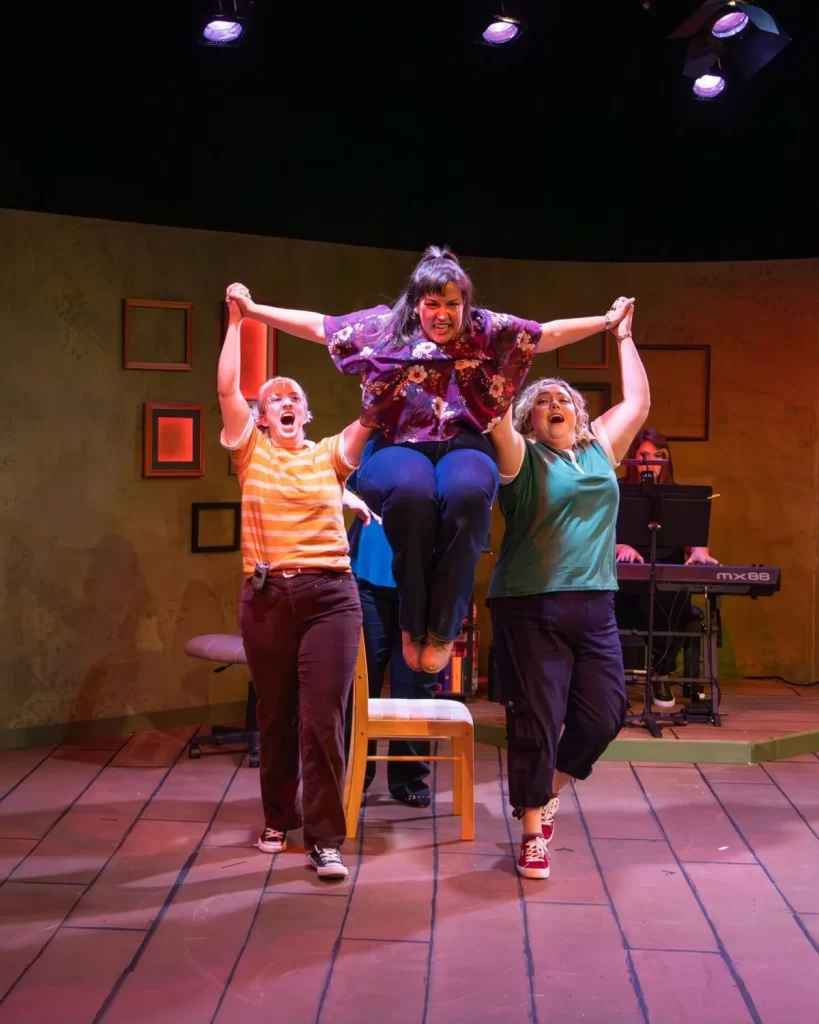
The Susan-led “Die, Vampire, Die!” is an ingenious way to vanquish demons and doubts, and Bailey is good at animated delivery.
In her professional debut, Fernelius makes quite an impact with silky-smooth vocals, and powerfully delivers a stunning “A Way Back to Then.” She has been standing out in college and community theater and is indeed ready for her close-up.
The show’s offbeat approach obviously differentiates from fairy tale-fiction in a land of enchantment (“Into the Woods” references abound, by the way). The quartet are more self-aware than naïve, more jaded and cynical about the highs and lows in life yet wear their hearts on their sleeves and they wish.
Their strengths and weaknesses are fully on display, not unlike those four unfiltered millennials in the HBO television series “Girls” that ran for five seasons. Raw and real, they aggravate each other and express their feelings.
Hunter fires off torrents of profanity, easily upset and distracted. (You can imagine him/her erupting at the neighborhood association meeting). Hawkins is funny in her no-holds-barred character’s tendency to go to DEF-CON 1.
Like many well-meaning longtime friends, Jeff knows how to deal with Hunter, and Orr is instinctive in her portrayal of the one who isn’t prone to histrionics.
There is a mature content advisory: “This play contains heavy adult language and open discussion of adult content. Audience discretion is advised.”
The pair of actresses playing actresses are creating an identity through their roles – “I Am Playing Me” and are initially at odds with each other – “What Kind of a Girl Is She?”
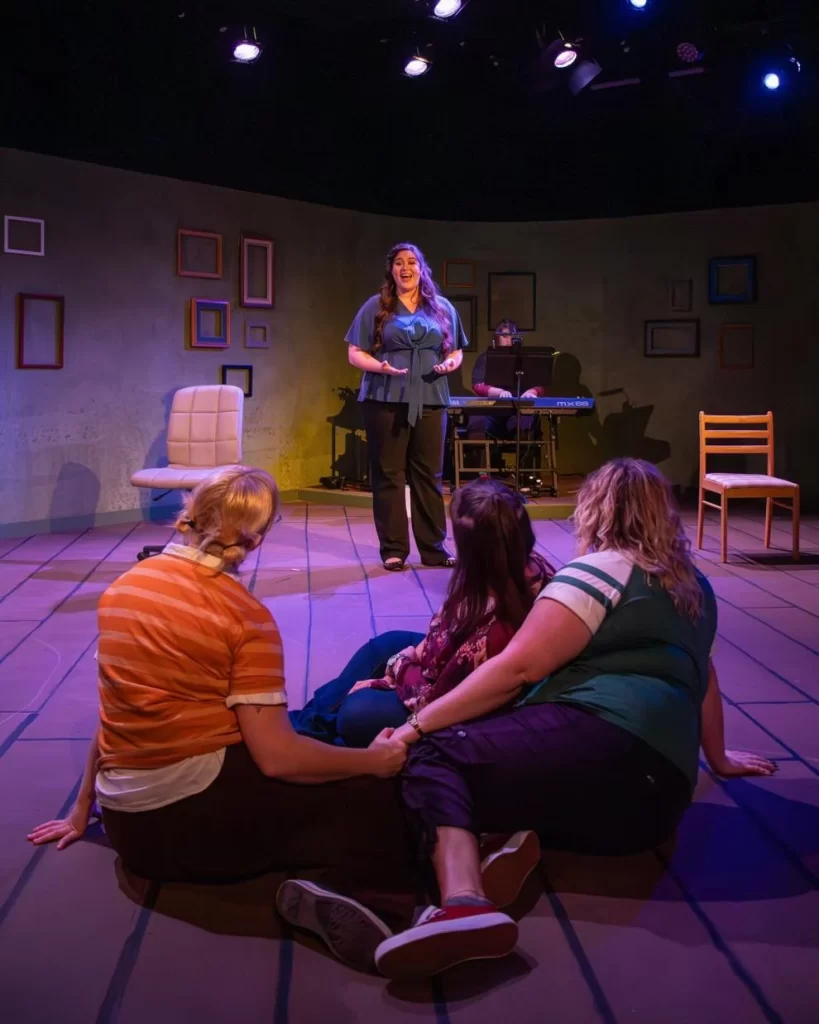
This is Prism’s first musical, and as a love letter to musical theater, it’s an interesting exchange of ideas and talents. It’s yet another version of “The Little Engine That Could,” showbiz style.
And in their hands – heartfelt. Co-producers Joy Addler (managing director) and Trish Brown (artistic director) founded this regional professional theater troupe with the mission of supporting women. This season’s theme is “Raise Your Voice.” I’d say this choice is apt.
The earnest presentation has a rough-around-the-edges quality yet has the enthusiasm of Judy Garland and Mickey Rooney gathering the neighborhood kids in those “Hey kids! Let’s put on a show!” old-timey musicals – but instead of a barn, they’re in a minimalistic rehearsal space with four chairs.
On a much smaller scale, this show follows the world-building on display in big-deal beloved musicals like “A Chorus Line,” “Singin’ in the Rain,” and “Dreamgirls.”
While it may not have a showstopper like “What I Did for Love,” the substantive songs showcase their doubts, fears, instincts, hopes and dreams in a relatable way.
Cady Bailey’s choreography is appropriate for the characters and incorporates snappy theatrical dance moves in an endearing way.
The quartet’s fervor for this material is perceptible, so is their warmth. The way they work together is specific, which adds a distinctive flavor to the show. There isn’t a whiff of artifice or slickness, rather a gutsy “Take us as we are” attitude.
And their work-in-progress show is constantly expanding and involving, as they adapt, evaluate, revise, re-evaluate, and have hissy fits. “Change It/Don’t Change It” illustrates those efforts, and “Awkward Photo Shoot” is a full-out meltdown of dysfunction.
Scenic designer Caleb D. Long has kept things basic and functional, with a nifty arrangement of frames that light up, and the noteworthy lighting design by Catherine Adams is effective. Golden also did the sound design, which is without issues in the intimate Kranzberg Black Box.
Their costumes, designed by Hayes, are everyday casual, look like out-of-their-closet selections. The sense of a team effort, with Sadie Harvey assistant director and props master, Katie Smith props artisan, carpenter William Higley, along with technical director Caleb D. Long, Golden, and Adams is apparent.
Bell and Bowen may not be as well-known as Pasek and Paul or as hip as Kerrigan and Loudermilk, but their memorable original work “[title of show]” earned awards nomination and elevated their credentials.
Bell, a graduate of Webster University’s Conservatory of Theatre Arts, won an Obie special citation award and was nominated for Drama League, GLAAD Media and Tony awards for best book of a musical. Bowen won an Obie special citation award for the music and lyrics.
After the musical debuted at the festival, two years later it opened off-Broadway at the Vineyard Theatre in 2006 and then moved to Broadway two years later, at the Lyceum Theatre, in 2008.
Proactively, in hopes of mounting the show at a Broadway theater, Bell and Bowen created a video blog, called “The [title of show] Show” that documented the musical’s progress and featured famous guest actors in episodes that went viral. In Episode 8, mission accomplished: the New York Times announced the show’s opening date at the Lyceum. (The show continued as a web series with a season 2, music videos and specials.)
What Bell and Bowen have learned the hard way – albeit with a delightfully improbable successful run about what all goes into making a musical — (and they did it before “Something Rotten!”) – can be summed up through the words of philosopher Ralph Waldo Emerson: “It’s not the destination, it’s the journey.”
This cast’s exuberance and the creative team’s efforts result in a satisfying tag-along adventure. Its candor and cheekiness are refreshing. And yes, that was Sutton Foster leaving a voice mail rejecting their offer. Touche!
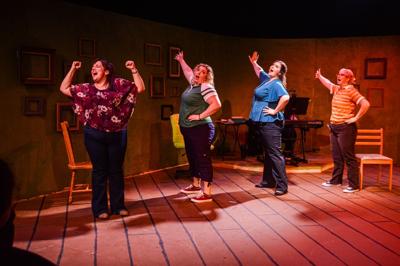
Prism Theatre Company presents “[title of show]” weekends through Sept. 8. Performances take place at the Kranzberg Center in Grand Center, 507 N Grand Blvd, St Louis, MO 63103. For more information: prismtheatrecompany.org.
For tickets, visit https://www.metrotix.com/events/detail/prism-theatre-company-title-of-show

Lynn (Zipfel) Venhaus has had a continuous byline in St. Louis metro region publications since 1978. She writes features and news for Belleville News-Democrat and contributes to St. Louis magazine and other publications.
She is a Rotten Tomatoes-approved film critic, currently reviews films for Webster-Kirkwood Times and KTRS Radio, covers entertainment for PopLifeSTL.com and co-hosts podcast PopLifeSTL.com…Presents.
She is a member of Critics Choice Association, where she serves on the women’s and marketing committees; Alliance of Women Film Journalists; and on the board of the St. Louis Film Critics Association. She is a founding and board member of the St. Louis Theater Circle.
She is retired from teaching journalism/media as an adjunct college instructor.

![Personality Adds Pizzazz to a Peppery, Plucky ‘[title of show]’ from Prism](https://poplifestl.com/wp-content/uploads/2024/09/title-of-show-1-750x302.jpg)
